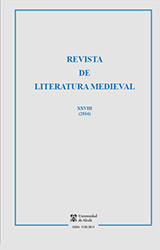«Qui·m disses, non a dos ans di Guiraut Riquier e la successione di Alfonso X»
DOI:
https://doi.org/10.37536/RLM.2016.28.0.62051Abstract
Riassunto: Una lunga tradizione critica spiega il vers di Guiraut Riquier, Qui·m disses non a dos ans come commento alla crisi dinastica innescata dalla morte dell’Infante D. Fernando de la Cerda (primogenito di Alfonso X) nel 1275. Quanti si sono occupati del componimento non hanno però chiarito né la posizione di Guiraut Riquier rispetto ai due pretendenti alla corona (D. Alfonso de Cerda, primogenito di D. Fernando, e D. Sancho, secondogenito di Alfonso X), né quale sia il comportamento del Rei sabio che ha provocato tante critiche da parte della corte e del trovatore narbonese. Un’analisi dettagliata del componimento e del contesto storico-politico in cui fu composto porta alla conclusione che Guiraut Riquier rimprovera Alfonso X per l’indecisione mostrata nel riconoscere la successione del figlio D. Sancho e per il poco vigore con cui si stava opponendo alle pretese di Filippo III di Francia (zio di D. Alfonso de la Cerda), che nel settembre del 1276 aveva dichiarato guerra al regno di Castiglia-León per difendere i diritti del nipote.
Parole-chiave: trovatori, Guiraut Riquier, Alfonso X el Sabio, Sancho IV el Bravo, Regno di Castiglia-León nel Medioevo, storia e storiografia medievale, Siete partidas.
«Qui·m disses, non a dos ans of Guiraut Riquier and the succession of Alfonso X»
Abstract: A long tradition of studies reads the vers of Guiraut Riquier, Qui·m disses non a dos ans like a commentary to dynastic crisis aroused after the death of Prince D. Fernando de la Cerda (eldest son of Alfonso X) in 1275. However, the scholars who studied the text don’t clarify the position of Guiraut Riquier about the two candidates to the crown (D. Alfonso de la Cerda, the firstborn of D. Fernando, and D. Sancho, second son of Alfonso X) and they don’t explain what was the behavior of the Learned King which caused so much criticism from the court and troubadour. A detailed analysis of the text and its historical and political context leads to the conclusion that Guiraut Riquier censures Alfonso X by indecision that the king showed to approve the succession of D. Sancho, his son, and by the low strength with which he was facing to claims of Philip III of France (uncle of D. Alfonso de la Cerda) who in September 1276 declared war to the Kingdom of Castilla-León to defend his nephew’s rights.
Keywords: troubadours, Guiraut Riquier, Alfonso X the Learned, Sancho IV the Brave, Kingdom of Castilla-León in the Middle ages, medieval history and historiography, Siete partidas.
Downloads
Métricas alternativas
Downloads
How to Cite
Issue
Section
License
The opinions and facts stated in each article are the exclusive responsability of the authors. The University of Alcalá is not responsible in any case for the credibility and aunthenticity of the studies.
Authors will retain the rights on their work, even if they will be granting the journal a non-exclusive right of use to reproduce, edit, distribute, publicly communicate and show their work. Therefore, authors are free to enter into additional, independent contracts for non-exclusive distribution of the works published in this journal (such as uploading them to an institutional repository or publishing them in a book), as long as the fact that the manuscripts were first published in this journal is acknowledged.
Works are published under the terms stipulated in the Attribution-NonCommercial-ShareAlike 4.0 International License (CC BY-NC-SA 4.0) that allows third parties to share the work under the following conditions:
Attribution — You must give appropriate credit, provide a link to the license, and indicate if changes were made. You may do so in any reasonable manner, but not in any way that suggests the licensor endorses you or your use.
NonCommercial — You may not use the material for commercial purposes.
ShareAlike — If you remix, transform, or build upon the material, you must distribute your contributions under the same license as the original.









